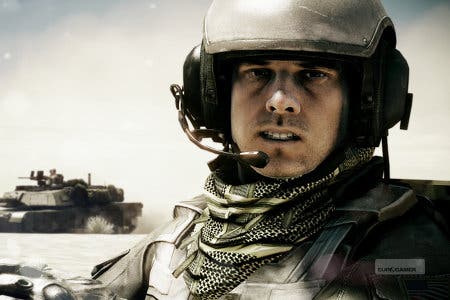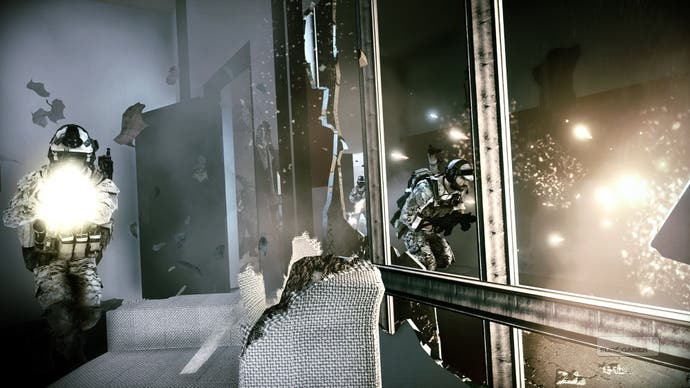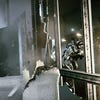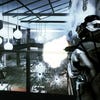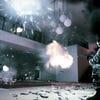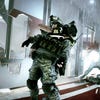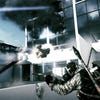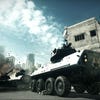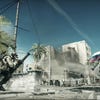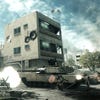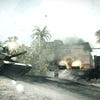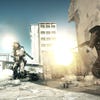Battlefield 3: the state of play
Is BF3 now finally the game it should have been at launch? DICE discusses.
With the release of the latest, gargantuan patch, some fans believe Battlefield 3 is now the game that should have launched in October 2011. Now, they believe, half a year after EA unleashed the shooter upon the gaming public, Battlefield 3's promise has finally been realised.
But for developer DICE, the job is only half finished. Major expansions have been announced, and one of them, Close Quarters, is out in June. Indeed there's a year's worth of content, support and patching planned - at the very least.
In this sweeping interview, executive producer Patrick Bach tells Eurogamer he'll never be satisfied with Battlefield 3, DICE's most successful game. He recounts its launch, delivers his verdict on sales, and answers difficult questions on accusations that Battlefield is becoming more like Call of Duty.
Now the dust has settled on Battlefield 3, how did it go for you?
Patrick Bach: On a high level it went way better than we expected, if you look at the sales and how many people who are actually spending time in the game and apparently having fun with it. Of course there were a lot of problems. It's a very complicated game, both when it comes to a tech perspective and from all the different bits and pieces of the actual product.
Of course, three months before shipping, I would have loved to have said, f*** it, let's ship it six months later. But you can't do that when you're that close.
Of course, three months before shipping, I would have loved to have said, f*** it, let's ship it six months later. But you can't do that when you're that close. I don't like developers who push their dates. It feels a bit like, come on, I want your game. You promised it. And now you're saying it's not ready. It's like, you don't decide when it's ready. I decide when it's ready. So I want to stick to what I promised and deliver something.
What we tried to do was make sure the game was good enough when we shipped it, and then post launch we have been updating it quite a bit, and also releasing these expansion packs, which also fix stuff in the game. There is definitely stuff I want to do better, but then again that's why I always try to make things better. I'm never content with what we're building. I always seek room for improvement, which is the core of how we work at DICE. We always want to do better and more and push the boundaries.
So am I happy? Absolutely. Am I satisfied? No. Absolutely not. I think we can do much better. We can push this even further.
Did Battlefield 3 meet expectations in terms of active users at launch and since then?
Patrick Bach: Absolutely. You always have a peak when you launch, and then it flattens out, and then it drops. We haven't seen that. We peaked, then we flattened out, and we haven't moved since. It went up when we released the Back to Karkand expansion pack. And then it went down slightly again. We saw when the latest patch released, the multi-gigabyte patch, that the PSU [Peak Simultaneous Users] went up. People actually started to play again. They felt, ah, okay, they fixed this and that, now I accept your changes, therefore I will now spend time with it. That was positive for us. So we haven't dropped players in the last couple of months. People just keep playing it.
I remember speaking to you two weeks before launch and you said you wanted to keep people playing for 12 months after launch, with new content.
Patrick Bach: And that's still the plan. We want to keep delivering new experiences within the same game. You don't have to re-learn. It's not re-tweaked. It's the same guns, the same movement, the same core experience, but here's the new twist on it, and here's this angle and here's this angle. That's creating a brand new experience even if it's the same game. We don't want people to have an excuse to stop playing it.
A few hardcore Battlefield players at Eurogamer believe that with the release of the latest patch, it's finally the game they had hoped for from the beginning, that it's now the game it should have been at launch. Do you agree with that assessment?
Patrick Bach: Yes. That's how we've always felt with all Battlefield games, actually. Battlefield 2 had the same cycle. When it was released people thought it was great. And then you had all the complaints. People still played it. We won all these awards. But the guys who were actually playing the game claimed after a thousand hours, I hate your game. It's the worst game ever. You should listen to me because I spent a thousand hours in it. It's like, well you're not really hating it. You're loving it so much that you get upset about these things.
We patched BF2 several times. It wasn't until 2.5 or something that people said, now it's done. Now this is the game you should have shipped. It's like, yeah, but that's two years after we launched the game. When we released this patch we felt the same thing. Now it's more what we wanted it to be. Next time we patch it we'll feel the same thing again, because there is always room for improvement.
It's such a complicated game. I don't know how many guns we have in the game. It's plenty. Then, together with all the vehicles, maps, and gadgets, they all need to work perfect on all maps, and it needs to work the same on all maps. It can't be, here's a special case for this map, and here's a special case for this map. That's the challenge for us, to find the ultimate balance of everything. I completely agree. Now the game has never been better.
Hardcore Battlefield 3 players feel now it's the game they hoped it would be.
Patrick Bach: Yeah. But it's interesting they say that. I've heard some people say, I didn't notice any difference. And I've heard people say, it was good, now you broke it. So when you say that, it's a bit like, this is the patch that made the game complete. But is that a good thing or bad thing compared to the other people who didn't notice anything, or say we broke it? We can't win.
I love the fact they notice the differences and the changes we made and approve of it, they get why we did this and that, because we spent a lot of energy looking at all the numbers. We didn't have all those numbers when we shipped. We didn't know about all the balancing issues. What I'm proud of is people trust us to stay in the game so when we release the patch they're still playing and can actually enjoy the result of the patch. In some games you never get a second chance, you never get the chance to do your first patch.
We are listening and we are not getting lazy. We know Battlefield is not a game where you just release it and then move on to something else. It's a game where you need to have a team that works on it post-launch.
Again, the game wasn't that bad, because then people wouldn't have played it at all. They did play it. Even your friends at Eurogamer were playing it when they got the patch, so they did notice the difference. To me it's trusting us to improve. I want to improve and do better, and it feels like our fans are actually aware of that. They know if we give them feedback, if you talk about these things, if you bring it up, if you point out issues, they will probably fix it. And yes, we will. We are listening and we are not getting lazy. We know Battlefield is not a game where you just release it and then move on to something else. It's a game where you need to have a team that works on it post-launch.
We have a huge team working on not only the expansion packs, but the patching, blocking cheaters, especially on PC where people try everything to cheat - they mod their PCs to do all kinds of crazy stuff. We have people only looking at telemetry, matching that towards the feedback that people actually write in forums. In a lot of cases it doesn't match up. It's like, no, this isn't a problem. You claim it's a problem. It's not a problem. The numbers tell me this is not a problem.
One interesting one is, people have been complaining about Operation Metro in the original game, that it's tight infantry, it's not Battlefield, people hate this, this is what makes people move away from Battlefield. Actually, it's the most popular map on all platforms.
Why do you think that is?
Patrick Bach: It's a great map. It's an awesome map. We spent a lot of energy proving to ourselves we can build those types of experiences as well, because we never had that in Battlefield 2. We said, why wouldn't you be able to do that in Battlefield? Battlefield has great guns, great movement, we have all these things including destruction that should make this a better experience.
The Close Quarters DLC is infantry focused and a bit more run and gun - not what we're used to from the traditional, open Battlefield experience.
Patrick Bach: There is no reason why you shouldn't be able to have this experience in Battlefield. There is no limitation in the game that prevents you from having this experience. And also, looking at the data and feedback, there are a lot of people who want it. They're asking for it and they want it.
It's a double edged sword. The traditional Battlefield player that loved Battlefield 1942 and today claims we're not building a proper Battlefield, we've been selling so many copies of Battlefield 3 now that there is no one Battlefield player. The game is so diverse and there are so many different ways of playing the game, that we are trying to cater for everyone.
If you play any of the Karkand maps, people are spending their time doing completely different things. I'm a tanker, I will spend the whole day just being a tanker. I will wait for it to respawn and I will do it again. You have people only sniping. You have people only playing jet. You have people only playing lone wolf. There are so many different ways of playing Battlefield that you can't say, oh, this is the way you play Battlefield.
It lies within the whole idea of Battlefield that Battlefield is a personal experience on a Battlefield where everything can happen and it's all player driven. All these planes, all these helicopters, all these awesome things that are happening, are actually people who love to do it. That tank battle over there between those tanks, someone will spend their time doing that. That's their life. I will actually interfere or I will go away. I choose. It's a game that's bigger than your own experience. And again, this is an example of that as well.
Is it the case that the Close Quarters DLC recreates a Call of Duty style experience, and that doesn't sit well with some Battlefield fans?
Patrick Bach: Yeah that could be sensitive to some people, that even mentioning tight indoor fighting is challenging. But there's a reason why we also revealed the future expansion pack, Armored Kill. Armored Kill is quite the opposite. It's the complete polarised version of Close Quarters, where it's only about the big open landscapes, it's only about vehicles and the more tactical way of playing Battlefield. It doesn't take away the joy of what you experience in Close Quarters. It complements it.
It's not about how fast you are. It's about how smart you are. The smarter player will win. If you know your tools, if you now your strengths, you can use that to win any match, in any game mode, on any map.
Today I feel like this and I want to do this - you can do it. You can just choose. You have a wider spectrum of experiences in the same game. You don't have to re-learn anything. You can still use what we think is the key to a great Battlefield player: your head. It's not about how fast you are. It's about how smart you are. The smarter player will win. If you know your tools, if you now your strengths, you can use that to win any match, in any game mode, on any map.
I've seen people who are really good at a specific thing and they can only play it on one specific map. That's fine, but then you have the players who try to win everything, and they're really good at close quarter fighting, they're really good team players, they're really good at vehicles, and they can control the battlefield from a more tactical standpoint as well. Using this [Close Quarters] as a practice round could also be beneficial for people who like to play on big open maps, because it makes you faster and think in a different way, even though you're playing Battlefield.
If you don't like it, you can get it for the guns. You get 10 new guns and you can bring them into the vanilla game if you want to.
You have a number of teams within DICE, as you've mentioned. What's the split?
Patrick Bach: We have those teams, which are quite big. Then of course we have some secret projects we can't talk about. But it's really hard to say what the split is today. It goes from a month per month basis more or less. People are helping out on different things. We're working with this expansion pack and future expansion packs. So depending on what you do, you're doing different things at different times. Of course we have good leadership in all the areas to make sure we get the most out of it. There's quite a lot going on.
There must be a team on the next game in the series, perhaps doing pre-production. But given we're all expecting the next-generation of consoles next year, how do you go about preparing adequately for that while building a game?
Battlefield 3 has been a huge success for us. The challenge is: how do you top that? What would you expect to top a game like this? Of course we're thinking about it. What could it be?
Patrick Bach: Battlefield 3 has been a huge success for us. The challenge is: how do you top that? What would you expect to top a game like this? Of course we're thinking about it. What could it be?
And then on top of that are the expansion packs, which we see as games. How do we make a better expansion pack than the last one. It's not about, how do we make money, how do we trick people into buying this? It's about, how do we create a new experience and turn it into something unique, rather than just, here's a new map? That would be easy. Anyone can do that.
There are a lot of challenges, and we are a bit picky, to be honest. We don't want to release stuff that is not on par with what we want it to be. But then we have the reality of time and money. You need to ship stuff.
You guys are known for being graphics wizards and push what's possible on hardware. Do you envisage significant improvement in visuals and AI what you're able to create using Frostbite 2 when the next generation arrives?
Patrick Bach: Yes and no. Yes because we will have a better understanding of our own technology. Knowing your tools would make it better. But then, if you look at the game we have, even on the current generation we're thinking about how we can make things better.
But then on top of that, it all depends on how much CPU, how much memory, how much GPU do you get extra? You're competing now with the high end PC, where you have a lot of power. When we released the first imagery on PC for Battlefield 3, people were like, oh my god, is this possible?
If the consoles don't take a big step beyond that, if it's on par with PC, PC will still be the bar of how pretty something can look. How do you make sure you create one game for all the platforms that is scaleable, so you don't have to rebuild the game? Here's a game with one AI, but here's the same game with a completely new AI because we couldn't do that on the other one. It's all about managing risk and focusing on scaleability and finding the right balance. It's hard to answer if you don't have the specs for the consoles.
